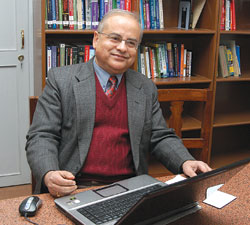|
|
Nepali Times: What was the impetus behind starting a new management school?
Bijay KC: South Asian Institute of Management is a regional institute for management studies. For now we offer a Master's in Management. I've worked at Tribhuvan University and Kathmandu University, and felt there was a need for a institution specifically for management training, like the Indian Institute of Management, with more focussed areas of study.
Also, we believe in providing a culture-specific education. The concepts and theories in the curriculum have been modified to fit our culture, particularly where strategies, human resources, and behaviour are concerned. The instructors will offer South Asia-specific examples and the case studies students will examine will be regional.
How is a Master's in Management different from a regular MBA?
MM courses focus on strategy and leadership skills development. Our emphasis is on practical education, so we offer special market-relevant packages, in line with students' specific career goals. We've developed a career counselling and placement cell. Students will consult with this unit to determine their career goals by the end of their first year. That helps us clarify what kind of knowledge and skills are required, so we can provide them with suitable courses.
How will your placement efforts work?
We can't guarantee placement, but we can facilitate the process. The institute's promoters are bankers and industrialists who have their own networks. Our job is to help introduce students to these networks. We also have an international advisory board and our hope is they will help bring in their networks so our students can compete in the international job market as well.
What challenges are you facing?
We can't deliver good education without a good faculty. It is especially hard to find experts in the field of management who are conceptually sound and also have practical experience. It becomes a challenge to balance cost and quality, because good teachers must be paid well, but there is only so much we can charge students.
For teachers it is extremely hard to develop local case materials. Particularly in Nepal, research is not given priority. It's unfortunate, because management research is the foundation on which we must develop local teaching materials. Also, business houses are not very open and do not always want to share information with students.
How do you plan to 'balance cost and quality'?
We aren't looking to make a profit, a middle class student should be able to afford our courses. We have some scholarships and research assistance programs. We're also working with banks on offering educational loans. We see our students working in banks, industries, corporate houses, and NGOs and we're confident they're a good investment.
Anyone from any discipline who has a bachelor's degree is a candidate for SAIM. The most important requirement is motivation. They have to demonstrate in the entrance test and interview that they can handle two rigorous years, full of research, lots of reading, writing case studies and reports, and making presentations.
What are your eventual goals?
We'll soon start offering short-term courses, and focus on research. In the next couple of years we will develop more focussed programs relating to finance, hospitality management, development management etc. We hope our students can create employment for others, and plan to start a program to help graduates set up their own businesses. Towards the end of their program, students will be asked to prepare business plans. We'll pick the three best and work with the banks to create a fund for such businesses. In the future we will also have faculty from all over South Asia, and also a good number of the 25 students in each graduating class. Another major goal is to have good management scholars, those who can deliver and are interested in research and can be good teachers.



